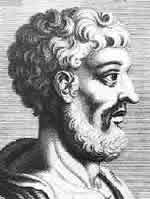 Major Ideas
Major Ideas
– It is futile to attempt to determine external realities (the nonevident) by appeal to appearances (the evident).
– We have access to only appearances and no reason to prefer one appearance to another.
– Appearances vary according to the condition of the observer and the nature of what is judged.
– Any claim about the nonevident can be opposed by an equally compelling contrary claim.
– Any effort to argue for the priority of some one appearance will involve circular reasoning or infinite regress.
– The skeptic, unlike the dogmatist, withholds judgement on all matters of external fact and, as a result, achieves the state of unperturbedness.
– Practical action will be taken, however, because of the involuntary promptings of nature.
Biography
A medical doctor and teacher, Sextus Empiricus was the last leader of the Pyrrhonean movement.
His written works are copies of lectures consisting of arguments worked out by previous skeptics. His ‘Against the Mathematicians’ and ‘Against the Dogmatists’ contain detailed arguments against each area of knowledge: the liberal arts (grammar, rhetoric, geometry, arithmetic, astronomy, and music), and what then were three branches of philosophy – logic, physics, and ethics.
Ironically, the above mentioned works are two of the most important sources of knowledge about the early history of astronomy, geometry, grammar, and the prevailing Stoic theology of the time.
Major Works of Sextus Empiricus
– Outlines of Pyrrhonism
– Against the Mathematicians

 Major Ideas
Major Ideas